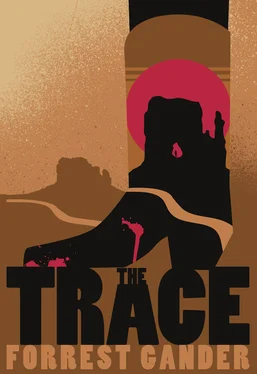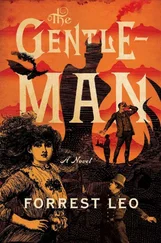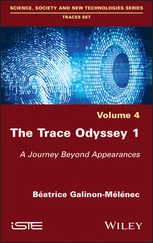Forrest Gander - The Trace
Здесь есть возможность читать онлайн «Forrest Gander - The Trace» весь текст электронной книги совершенно бесплатно (целиком полную версию без сокращений). В некоторых случаях можно слушать аудио, скачать через торрент в формате fb2 и присутствует краткое содержание. Год выпуска: 2014, Издательство: New Directions, Жанр: Современная проза, на английском языке. Описание произведения, (предисловие) а так же отзывы посетителей доступны на портале библиотеки ЛибКат.
- Название:The Trace
- Автор:
- Издательство:New Directions
- Жанр:
- Год:2014
- ISBN:нет данных
- Рейтинг книги:3 / 5. Голосов: 1
-
Избранное:Добавить в избранное
- Отзывы:
-
Ваша оценка:
- 60
- 1
- 2
- 3
- 4
- 5
The Trace: краткое содержание, описание и аннотация
Предлагаем к чтению аннотацию, описание, краткое содержание или предисловие (зависит от того, что написал сам автор книги «The Trace»). Если вы не нашли необходимую информацию о книге — напишите в комментариях, мы постараемся отыскать её.
The Trace — читать онлайн бесплатно полную книгу (весь текст) целиком
Ниже представлен текст книги, разбитый по страницам. Система сохранения места последней прочитанной страницы, позволяет с удобством читать онлайн бесплатно книгу «The Trace», без необходимости каждый раз заново искать на чём Вы остановились. Поставьте закладку, и сможете в любой момент перейти на страницу, на которой закончили чтение.
Интервал:
Закладка:
“What?” Hoa snapped up in the back seat.
“Nothing, sorry, it’s nothing.” He had whacked his elbow on the door and his ear on the steering wheel. He was dizzy and out of breath and his ankle throbbed. “I just have to pee.”
She stayed riveted in her sitting position. His door was still open. Now he gripped the steering wheel with one hand, planted his good foot on the rocker panel, and he extended his body from the open door to pee. His brain was woozy, cottoned with alcohol. Stupid, stupid. But considering his swollen ankle, his culpability for their situation, and the bottle of good tequila, well, he needed it. At least he had needed it a few hours ago. The night had been interminable.
He leaned from the door peeing in the general direction of the tarantula, then sat back in his seat, listening to the ratcheting of insects, the overlapping waves of sound, as he revised variations on ways to find help in the morning. Hoa was lying down again, mumbling something to herself or to him.
“You remember,” he said in case she was awake, “you once told me a story you read in Ford Maddox Ford’s memoir of Joseph Conrad? Remember that?”
Dale’s voice was low now, his ankle settling down. He was talking himself calm, talking her calm. He went on quietly, not needing any response from her, looking through the windshield into the stars, audience enough. “How Conrad and Ford used to meet in England at some farm on a heath one of them was renting? They were collaborating on a book together is what you told me. And they’d go out on this heath just walking in big circles for an hour or so, and they were both famous talkers but Conrad was the really big one. I remember you said Conrad was kicking at the gorse. You used that word because I’d never heard anyone say it before — maybe I’d read it sometime and forgotten it. And you said Conrad was talking nonstop about his depression and his financial straits and about the Congo and how he had been poisoned by the Bomese, who locked him in a hut to die. But in the hut, there turned out to be all these old tins of condensed milk. And while Conrad is convulsing and dying, he gets the idea that maybe he should drink some of the condensed milk. He was just able to pierce the cans with a sharp stick and drink a few of them — only a master bullshitter could pass this one off — and of course, condensed milk turned out to be an antidote for the poison.
“I remember you said that Ford went on to describe Conrad. He said he was always quoting Flaubert and Maupassant, long passages, almost entire books, and commenting on the affairs of all these minor English politicians whose biographies he’d read and remembered. Conrad had an incredible memory and he would talk and talk, Ford not getting a word in edgewise. And the two of them would stop walking and stand still for a while and roll cigarettes and light them for each other, Conrad never letting up, telling stories a mile a minute. And Ford said that almost the whole time Conrad held forth in the field or the heath or wherever, he, Ford, was watching this pretty white-throated wren that seemed to be following them, hopping back and forth on low branches and then dropping to the grass or gorse or whatever to peck at something. And Ford — he’s young enough to be Conrad’s son and full of himself — sees himself as the great Modernist writer coming to save English literature. He thinks Conrad is too self-absorbed to register the barest detail of their surroundings. As far as Ford can tell, Conrad might as well be stem-winding at The Eagle Pub or in his living room as on the heath. But then, you told me, months later, Ford Maddox Ford opens a literary magazine and reads an account written by Conrad of that very outing on the heath, and the whole episode is just a showcase for Conrad’s meticulous description of the antics of that white-throated wren.
“Anyway, that’s what you told me. So I read the whole book, and when I finished, I went through it again backward, glancing at every single page, and I never came across the event you described. There’s this great story Conrad tells about how when he first landed in England, some guy jumped out at him on the highway and shoved a volume of the English Bible into his hands, a pocket edition printed on rice paper. Conrad tore out pages and rolled his cigarettes in them for a month, but before he smoked, he always read the whole page, both sides, and that’s where he got his first real feeling for the English language. And there’s a memorable account of Conrad and Ford using an antique pistol to shoot rats in some abandoned granary — typically, Ford claims to pick one off at a ridiculous distance — but the part you told me about the two of them walking around talking and the wren, which is really even better, it’s just not in there.”
She had been breathing softly and regularly, with a tiny click at each inhalation, maybe she needed to blow her nose. He assumed she was sleeping. But she said in a flat natural voice, “No book’s going to get us out of here.”
Friday Morning
Daylight came and Hoa rose slowly into sitting position, her feet straddling the driveshaft hump on the floor. She reached into her purse, found her lens drops and squeezed some into her eyes, dabbing the runoff with her shirttail. Tired and stiff, she opened the back door. Last night she had been cool enough to rouse herself to try rolling up the windows. But they were electric and Dale had the keys in his pocket or somewhere. She had jostled his shoulder and called his name but by then — whenever that was, early this morning before any hint of light — he must have been in a stupor and didn’t wake, so she lay back down and listened to a far off yipping she couldn’t identify. Some cross between a small dog and a rooster. Now, she felt around on the floor for her Adidas and put them on, slung her purse over her neck and stepped outside into a becalmed world where she didn’t belong.
A big sun hovered already above the horizon. The morning was warm but not yet hot. Don’t worry about that, she thought. The heat’s coming. She could hear her dread stirring inside her. It was as though one of the sun’s myriad rays were dedicated to her alone, as though it had descended like the needle on a record player arm right onto her brain. And it was playing her thoughts, turning each groove of fearfulness into a sound only she could hear. She tried to get control of her flash panic, standing in the loose dirt, her back to the sun, consciously relaxing her shoulders. She looked down the trail ahead of the car. It was still there: the inhuman and more of the inhuman. Coming right at her like an avalanche of nada. She took a deep breath and let it out, joining her hands in front of her chest in the prayer position, trying to focus her energy.
The last peopled place they had passed was the little grit-blown mining town of Hercules. On the outskirts, they’d seen rubbled plateaus and enormous sinkholes. Identical houses looked onto ruler-straight streets while big, faded-yellow water trucks — Dale told her they called them ranas , frogs — sprayed water behind them onto the powdery road leading to the mine. They had driven west out of Hercules on a dirt road toward El Barreal. According to the map, they should have seen a lake on their right, Laguna de Ventura, but they never did. Going west and northwest, as they had, they should have hit route 67 just above La Perla after five or six hours. But the way forked over and over. They thumped across cattle guards, but saw no cattle. Hoa had to get out twice to open and close stick-and-wire gates. They had stuck to what they thought was the main trail, but it was impossible to tell.
If we keep going west, Hoa told herself, there’s no way to avoid running into route 67. It may take awhile and we’ll be thirsty, we’ll be exhausted, but route 67 is west, that’s a fact.
Читать дальшеИнтервал:
Закладка:
Похожие книги на «The Trace»
Представляем Вашему вниманию похожие книги на «The Trace» списком для выбора. Мы отобрали схожую по названию и смыслу литературу в надежде предоставить читателям больше вариантов отыскать новые, интересные, ещё непрочитанные произведения.
Обсуждение, отзывы о книге «The Trace» и просто собственные мнения читателей. Оставьте ваши комментарии, напишите, что Вы думаете о произведении, его смысле или главных героях. Укажите что конкретно понравилось, а что нет, и почему Вы так считаете.












